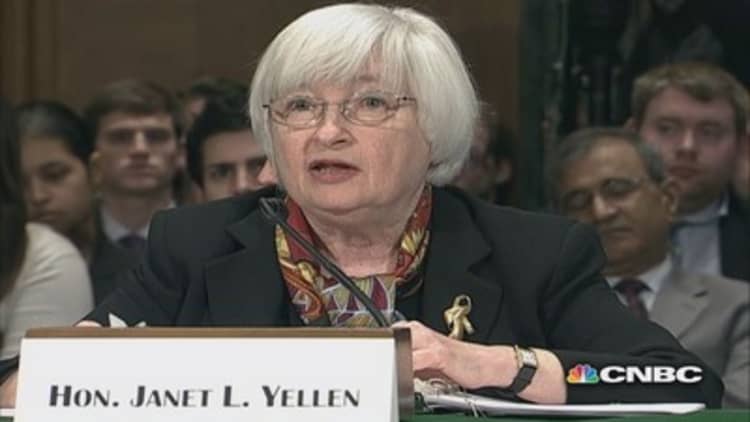
Federal Reserve Chair Janet Yellen said Thursday that harsh winter weather may have had an impact on recent economic data and reiterated her stance that accomodative monetary policy should remain appropriate for some time.
(Read more: The Fed is 'out of touch': Polcari)
"Since my appearance before the House committee, a number of data releases have pointed to softer spending than many analysts had expected," Yellen told the Senate Banking Committee. "Part of that softness may reflect adverse weather conditions, but at this point it is difficult to discern how much."
Most recently, the number of Americans filing for jobless claims unexpectedly shot higher last week, the Labor Department said Thursday.
Stocks drifted higher during the testimony, while Treasury pricesremained steady.
Yellen said the tight fiscal policy has posed a drag on the U.S. economy, also weighing on monetary policy.
"The drag is likely to lessen substantially during the current year, but nevertheless there remains some drag," she said. "Of course it is true that because there has been fiscal policy drag the burden on monetary policy has been larger."
While the Fed Chair doesn't necessarily see "broad bubble concerns," she flagged a few areas the central bank is monitoring.
"For example, underwriting standards in leveraged lending clearly appeared to be deteriorating. We have addressed that with supervisory guidance and special exams...We have regulatory and supervisory tools."
On the jobs front, Yellen stressed that 6.5 percent is not the central bank's definition of full employment, adding that unemployment rate alone is not sufficient to measure the health of a job market.
The has Fed previously said it won't consider raising rates until the unemployment rate hits 6.5 percent, as long as inflation expectations remain below the 2.5-percent mark.
"An additional 5 percent, an unusually high fraction of our labor force, is working part time for economic reasons ... and we have an unusually high fraction of Americans who are unemployed and have been for substantial amounts of times. So, as we go to fuller consideration how is the labor market performing, we need to take all of those things into account."
Yellen reinforced that the Fed expects to continue drawing down the program and shelve the purchases some time in the fall. She repeated the purchases are not on a pre-set course, and the Fed would reconsider its plan if there were a "significant change" to the economic outlook.
But first the Fed needs to get a "firmer handle" on whether the soft data is due to weather or some more fundamental slowdown, Yellen said.
Interest rates have been near zero since the worst of the financial crisis in late 2008; the Fed has meanwhile swollen its balance sheet to more than $4 trillion in a further attempt to stimulate investment, hiring and growth in the United States.
Yellen's previously scheduled appearance before the committee two weeks ago was postponed due to the snowstorm.
The Fed currently purchases $65 billion in Treasurys and mortgage-backed securities every month as part of its long-running stimulus measures, down from the program's original $85-billion-a-month amount. The FOMC is scheduled to meet on March 18 and 19.
(Read more: 'Hurdle pretty high' on tapering: Fed's Williams)
—By CNBC's JeeYeon Park (Follow JeeYeon on Twitter: @JeeYeonParkCNBC) Reuters contributed to this article.


